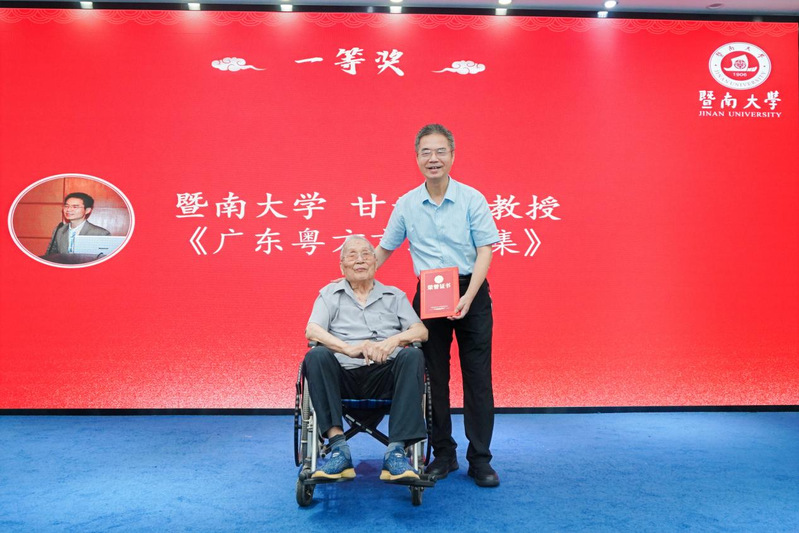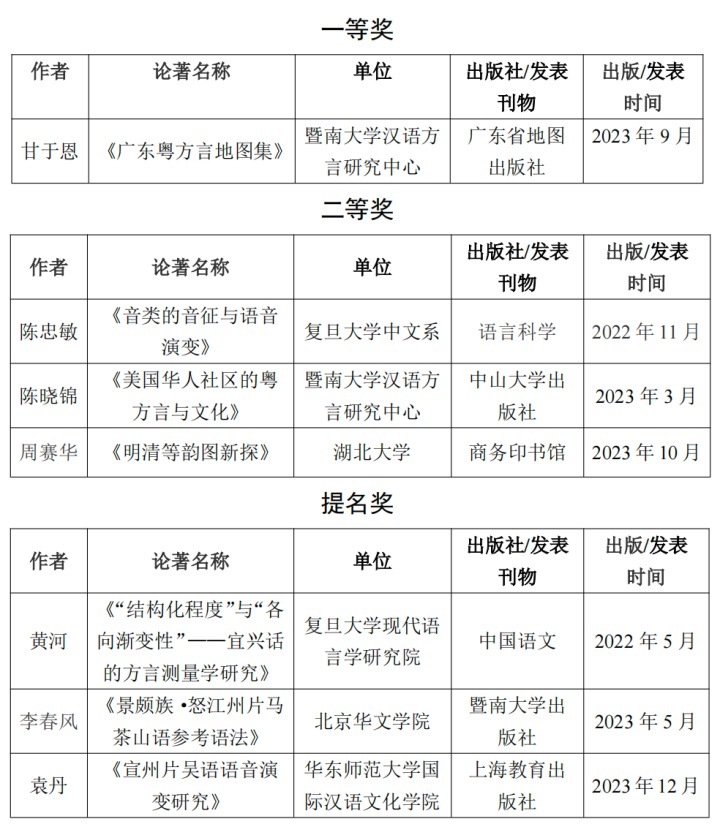- ABOUT JNU
- ADMISSION
-
ACADEMICS
- Schools and Colleges
-
Departments and Programs
- Arts College of
- Chinese Language and Culture College of
- Economics College of
- Electrical and Information Engineering College of
- Foreign Studies College of
- Information Science and Technology College of
- Environment School of
- Humanities School of
- International Business School
- International Studies School of
- Journalism and Communication College of
- Law School
- Liberal Arts College of
- Life Science and Technology College of
- Management School of
- Marxism School of
- Medicine School of
- Pharmacy College of
- Physical Education School of
- Science and Engineering College of
- Shenzhen Tourism College
- Research Institute
- Research Center
- Programs in English
- Majors
- Study Abroad
- Online Learning
- RESEARCH
- CAMPUS LIFE
- JOIN US
Jinan University Hosts 3rd Zhan Bohui Linguistics Award Ceremony and AI+ Dialect Frontier Forum
Editor: Chen Guoqiong
Publisher: College of Liberal Arts
Date: July 18, 2025
Shipai Campus buzzed with scholarly activity on July 10 as Jinan University staged the 3rd Zhan Bohui Linguistics Award Ceremony alongside the Artificial Intelligence+ Dialect Frontier Forum. The even brought together more than a hundred linguists, government officials, alumni, and students to celebrate achievements in Chinese language and dialect research and to chart the future of interdisciplinary work with AI.

Organizers and attendees
The ceremony was co-hosted by the School of Literature’s Party Committee, the Chinese Dialect Research Center at Jinan University, the Education Development Foundation of Jinan University, and the Zhan Bohui Linguistics Award Review Committee. Among the attendees were Zhan Bohui, renowned linguist and Secretary of the Party Group and Chairman of the Guangzhou Federation of Social Sciences; Cui Songdong, former Party Secretary of Jinan University; Jiang Shuzhuo, Deputy Party Secretary of Jinan University; Xia Quan, a Zhan Bohui Award Evaluation Committee member and Institute of Linguistics, Chinese Academy of Social Sciences; and Zhang Zhenxing. The event underscored the university’s continuing commitment to advancing dialectology and its intersection with cutting-edge technologies.

Zhan Bohui Linguistics Award Highlights
Established in 2020 by Professor Zhan Bohui with a 500,000-yuan endowment, the award honors scholars who have made outstanding contributions to Chinese language and dialect research and aims to cultivate young scholars to preserve linguistic heritage while driving the discipline forward. After rigorous peer review, the third Zhan Bohui Linguistics Award recognized top work in the field.
First Prize
•Gan Yuen, for the paper “Atlas of Guangdong Cantonese Dialects,” produced by the Chinese Dialect Research Center at Jinan University and published by Guangdong Map Publishing House in September 2023. The atlas represents the first comprehensive, systematic mapping of Guangdong Cantonese dialects, drawing on more than 150 phonetic, lexical, and grammatical surveys. It delineates the geographic distribution of Cantonese across Guangdong and the Hong Kong–Macao region, offering a foundational reference for dialect geography and linguistic study.
AI+ Dialect Frontier Forum
Following the awards, the Artificial Intelligence+ Dialect Frontier Forum kicked off, focusing on the convergence of AI technology and dialectology. Researchers from institutions nationwide shared insights on dialect speech recognition and synthesis, big data for dialect research, and AI-driven preservation and transmission of dialects. Panelists discussed opportunities and challenges posed by rapid AI development, noting how automatic transcription, intelligent lexicon retrieval, and digital preservation tools can safeguard dialect diversity while expanding public engagement with dialect culture.
Forum themes and takeaways
•AI-assisted dialect processing: leveraging deep learning-based speech recognition models and corpus-building schemes to facilitate dialect protection and revival.
•Data challenges: addressing dialect variation and the scarcity of small-language corpora to improve recognition accuracy and research validity.
•Outreach and cultural impact: employing AI-enabled voice assistants and dialect apps to integrate dialects into daily life, supporting dynamic, lived-in language preservation.
Leadership reflections
Professor Zhan Bohui stressed that linguistic research must fuse tradition with innovation, honoring scholarly heritage while embracing new technologies and interdisciplinary collaboration. The award's existence and the AI+ forum exemplify a forward-looking model that invites broader participation from scholars and practitioners to advance Chinese linguistics.
Deputy Secretary Xia Quan highlighted Jinan University’s longstanding emphasis on language and cultural research, noting that the Chinese Dialect Research Center has become a leading hub for dialect studies in China. The university’s ongoing support for linguistics research, academic exchange, and talent development aligns with national aims to strengthen cultural soft power and preserve traditional Chinese culture.
Significance
The event underscored Jinan University's role in nurturing linguistic scholarship and its commitment to integrating technology with humanities research. By honoring scholars and fostering cross-disciplinary dialogue, the university aims to advance both the study and preservation of Chinese dialects in an era of rapid digital transformation.
NEWS
- About the University
- Quick Links
Copyright © 2016 Jinan University. All Rights Reserved.




